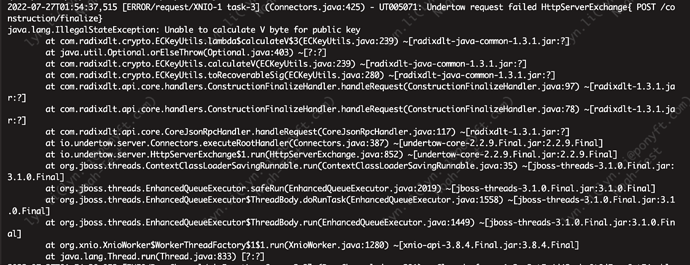Lyn_Lee
27 July 2022 06:41
1
I have a test demo by using bouncyCastle.
@Test
public void testBouncyCastleSecp256k1() {
X9ECParameters p = SECNamedCurves.getByName("secp256k1");
ECDomainParameters params = new ECDomainParameters(p.getCurve(), p.getG(), p.getN(), p.getH());
BigInteger privKey = new BigInteger("b77e91f2b6905bd0cb7295c529b20152181b5e9e18f62c02b3c2d75747a73f1e", 16);
BigInteger pubKey = new BigInteger("02d7482187387eef4d462864fe0f41a6780cfb25d7376b5535b6af8640d97281d3", 16);
String msg = "041f2b145c7fa7d8b49de0e9de59fb96a270b3b1869b1d1cbf2059a560542b2c";
ECPrivateKeyParameters privParams = new ECPrivateKeyParameters(privKey, params);
byte[] privateKeyBytes = ECKeyUtils.adjustArray(privParams.getD().toByteArray(), 32);
System.out.println("privKey : " + Utils.HEX.encode(privateKeyBytes));
byte[] messageBytes = HashUtils.sha256(msg.getBytes()).asBytes();
ECDSASigner signer = new ECDSASigner(new HMacDSAKCalculator(new SHA256Digest()));
signer.init(true, privParams);
BigInteger[] signature = signer.generateSignature(messageBytes);
byte[] derBytes = ECKeyUtils.toUnrecoverableDERBytes(signature[0], signature[1]);
System.out.println("Signature(DER format): " + Utils.HEX.encode(derBytes));
BouncyCastleKeyHandler handler = new BouncyCastleKeyHandler(CustomNamedCurves.getByName("secp256k1"));
if (handler.verify(messageBytes, signature[0], signature[1], pubKey.toByteArray())) {
System.out.println("verifySignature successfully");
} else {
System.out.println("verifySignature failed");
}
}
And it returns the signature in DER format :Signature(DER format): 30440220079ad26fdbf47ef41659e32a39b1984b486ff609205e8b4914e41bc51fa47a2902207f9dd5f5c06aee3f4946e6db7160b7f7099b9b2fbb0c632259cea1ea12a577a8
But it always return the error “Unable to calculate V byte for public key” when I use this signature to finalize transaction .
When I use the same private key to sign the transaction by python lib and finalize transaction, it returns the correct signed transaction and transaction identifier info.
Mleekko
27 July 2022 13:45
2
Where do BouncyCastleKeyHandler, ECKeyUtils and HashUtils come from? I can’t find them in BouncyCastle.
Mleekko
27 July 2022 13:55
3
Also, the DER signature differs from what I get (UPD: the signature might vary because it is non-deterministic):
package live.radix.example;
import com.radixdlt.crypto.ECDSASignature;
import com.radixdlt.crypto.ECKeyPair;
import com.radixdlt.crypto.ECKeyUtils;
import com.radixdlt.crypto.exception.PrivateKeyException;
import com.radixdlt.crypto.exception.PublicKeyException;
import com.radixdlt.utils.Bytes;
import org.apache.commons.codec.DecoderException;
import org.apache.commons.codec.binary.Hex;
import org.bouncycastle.asn1.ASN1Encodable;
import org.bouncycastle.asn1.ASN1Integer;
import org.bouncycastle.asn1.ASN1OutputStream;
import org.bouncycastle.asn1.DLSequence;
import org.bouncycastle.crypto.params.ECPrivateKeyParameters;
import org.junit.Test;
import java.io.ByteArrayOutputStream;
import java.io.IOException;
import java.math.BigInteger;
import static org.junit.Assert.assertEquals;
public class SignerTest {
@Test
public void testBouncyCastleSecp256k1_2() throws PrivateKeyException, PublicKeyException, DecoderException, IOException {
BigInteger privKey = new BigInteger("b77e91f2b6905bd0cb7295c529b20152181b5e9e18f62c02b3c2d75747a73f1e", 16);
String msg = "041f2b145c7fa7d8b49de0e9de59fb96a270b3b1869b1d1cbf2059a560542b2c";
ECPrivateKeyParameters privParams = new ECPrivateKeyParameters(privKey, ECKeyUtils.domain());
byte[] privateKeyBytes = ECKeyUtils.adjustArray(privParams.getD().toByteArray(), 32);
ECKeyPair keyPair = ECKeyPair.fromPrivateKey(privateKeyBytes);
assertEquals("02d7482187387eef4d462864fe0f41a6780cfb25d7376b5535b6af8640d97281d3", keyPair.getPublicKey().toHex());
byte[] bytes = Hex.decodeHex(msg);
byte[] derSignature = toDerSignature(keyPair.sign(bytes));
System.out.println(Bytes.toHexString(derSignature));
}
private byte[] toDerSignature(ECDSASignature sign) throws IOException {
var os = new ByteArrayOutputStream();
var asn1OutputStream = ASN1OutputStream.create(os);
asn1OutputStream.writeObject(
new DLSequence(
new ASN1Encodable[]{new ASN1Integer(sign.getR()), new ASN1Integer(sign.getS())}));
return os.toByteArray();
}
}
(requires the below dependency)
<!-- https://mvnrepository.com/artifact/live.radix/radixdlt-java-common -->
<dependency>
<groupId>live.radix</groupId>
<artifactId>radixdlt-java-common</artifactId>
<version>1.2.1</version>
</dependency>
Lyn_Lee
27 July 2022 14:27
4
This is toUnrecoverableDERBytes function detail in my test.
public static byte[] toUnrecoverableDERBytes(BigInteger r, BigInteger s) {
final ByteArrayOutputStream os = new ByteArrayOutputStream();
final ASN1OutputStream asn1OutputStream = ASN1OutputStream.create(os);
try {
asn1OutputStream.writeObject(
new DLSequence(new ASN1Encodable[]{new ASN1Integer(r), new ASN1Integer(s)}));
} catch (IOException e) {
throw new RuntimeException(e);
}
return os.toByteArray();
}
r and s are both generate by ECDSA signing progess, so I passed them in directly as parameters
var signer =
new ECDSASigner(
useDeterministicSignatures
? new HMacDSAKCalculator(new SHA256Digest())
: new RandomDSAKCalculator());
signer.init(true, new ECPrivateKeyParameters(new BigInteger(1, privateKey), domain));
var components = signer.generateSignature(hash);
var r = components[0];
var s = components[1];
My private key and public key is not genrated by ECKeyPair in radixdlt-java-common, but I think it should not effect.
Mleekko
27 July 2022 15:10
5
ok, so the signing part looks ok, can you please share the code that you use to build the TransactionFinalizeRequest to the API ? in particular creating the signature param.
Lyn_Lee
27 July 2022 15:11
6
Mleekko:
BouncyCastleKeyHandler
BouncyCastleKeyHandler, ECKeyUtils and HashUtils are a part I extracted from radix-java-common
Lyn_Lee
27 July 2022 15:11
7
Mleekko:
signature
This is my API request send to url : {{dev_node}}/transaction/finalize
{
"network_identifier": {
"network": "mainnet"
},
"unsigned_transaction": "079da6d7ef3f9465e0e3260986098c6c50fe40fe0a1b0fc0d4c2c101821ce563b300000001010021000000000000000000000000000000000000000000000000000094df774aab000002004506000402f01ceafea2166eac118485daf14e2afa75caddfe716fc92ef6a1eaa41953561e01000000000000000000000000000000000000000000000000e23a3d3a66a157850008000002004506000402f01ceafea2166eac118485daf14e2afa75caddfe716fc92ef6a1eaa41953561e01000000000000000000000000000000000000000000000000e2363fdd968c2785020045060004024fa1f2474d91251ae938b46e35a6242ccb8f6d5f55e585f0e72a41afadba999b010000000000000000000000000000000000000000000000000003fd5cd015300000",
"signature": {
"public_key": {
"hex": "02f01ceafea2166eac118485daf14e2afa75caddfe716fc92ef6a1eaa41953561e"
},
"bytes": "3045022100df285555c4734f081648e3e35298abba672fb84900103bf24102e8b7cef352cc02201722c268e8e8989fa30e10993cc1c739e6dbd4578063211d6a672b9e6da01e7e"
},
"submit": "false"
}
Mleekko
27 July 2022 15:26
8
public_key.hex here differs from your above example. is this request for a different address?
Lyn_Lee
27 July 2022 15:41
9
Yes, this is a recent request
Lyn_Lee
27 July 2022 16:22
10
Thank you for your reply .
I use the wrong decode function and one more time sha256 operation.
byte[] messageBytes = HashUtils.sha256(msg.getBytes()).asBytes();
should change to
byte[] bytes = Hex.decodeHex(msg);
2 Likes


